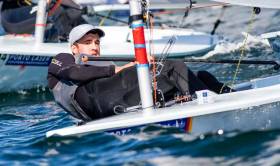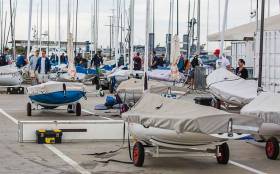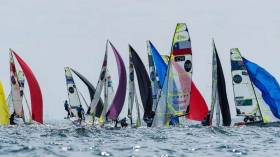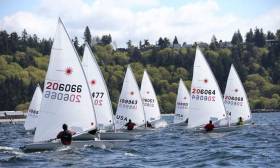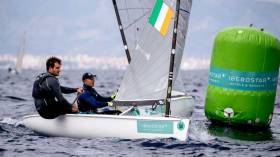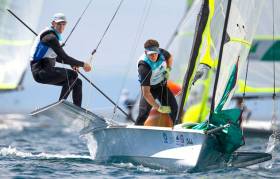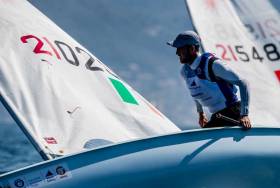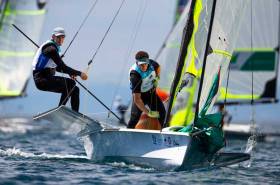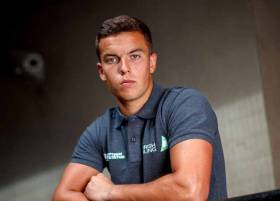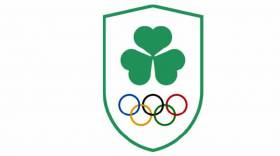Displaying items by tag: olympic sailing
Irish Olympic sailor Finn Lynch is lying in 13th place, with three days left of the Laser Senior European Championships & Open European Trophy in Porto, Portugal.
It follows on from a string of top performances this season for the County Carlow solo sailor where he reached the medal race at three consecutive international regattas, including two World Cup events.
The National Yacht Club ace lies scored a 2 and a 3 in Day 3 (yesterday) to give him a personal best at the European Championships and the prospect of another medal race finish this season.
He competes against 162 competitors including the top 48 ranked sailors in the world. Ewan McMahon lies in 26th place and Liam Glynn in at 73.
In the women's Laser Radial division, Aisling Keller and Aoife Hopkins (scrub to 1:27 on the vid above to see Aoife's interview) are lying at 47th and 48th respectively out of the fleet of 91 competitors and made the gold fleet cut.
There are five members of the Irish Sailing Team in action this week at the event, competing in a field of 334 international sailors from 42 nations: Aoife Hopkins, from Howth, Co Dublin, who was the European Champion for U21 Laser Radial in 2017; and Finn Lynch, who was Ireland’s youngest helm ever to compete at an Olympic Games when he sailed at Rio 2016.
Lynch was also the U19 World Champion in the Laser in 2014, and silver medallist in the 2012 Youth World Championships (Laser Radial).
Also in the Lasers are Liam Glynn, from Bangor, Co Down, Bronze medallist at U21 World Championships in Laser in 2018 and Topper World Champion in 2013; and Ewan McMahon, the silver medallist at the Laser Radial Youth World Championships in 2016 (of Howth YC). Aisling Keller, from Tipperary, a silver medallist in U21 Laser Radial European Championships in 2017 competes against Aoife in the Laser Radial.
Racing continues at the Laser Senior European Championships & Open European Trophy 2019 until Saturday 25 May.
Results here
Delayed Start to Finn Europeans in Athens
The sailors at the 2019 Finn Open European Championship in Athens will have to wait another day before racing can commence after a long day waiting onshore Monday, with no racing possible in very light and unstable winds.
As Afloat previously reported here, two Irish sailors Oisin McClelland and Finn Lyden are competing.
The fleet of 84 boats from 33 nations spent the day wishing for wind, but with several rain fronts passing over and often no more then 3-4 knots of wind, racing was eventually abandoned for the day shortly before 16.00.
On Tuesday, the morning conditions are expected to be similar, so racing has been put back to 13.30 on Tuesday with three races scheduled.
This week's 49er 2019 European Championships, to be held in Weymouth from 13-19 May includes the 49er, 49erFX, and Nacra17 and Ireland is competing in both the men and women's division of the Olympic skiff class. See details of the Irish Olympic Sailing team competing here.
There are more potential winners than any 49er event in history. Returning to the waters which hosted the 2012 London Olympic Games sailing regatta, any one of twenty teams from around the world have the proven ability to take their place on the top step of the podium.
In past Olympic cycles, the 49er fleet has had stand out performances by a number of teams which ultimately resulted in Olympic medals and top professional skippering positions in the America's Cup and Volvo Ocean Race.
In the Rio 2016 cycle, New Zealand’s Peter Burling and Blair Tuke dominated the class, winning four World Championships in a row on their way to Olympic Gold. Preceding Burling/Tuke, Australian’s Nathan Outteridge and Iain Jensen were the form boat during the lead into the London 2012 games which also culminated in Olympic glory. Preceding that were the reigns of Chris Draper (GBR), Iker Martinez (ESP), and Chris Nicholson (AUS) all of whom went on to helm America's Cup or Volvo Ocean Race teams.
In 2018 and 2019, the 49er class has seen a plethora of event winners and no one team dominating. Whoever manages to emerge will truly be one of the best sailors today.
The most noticeable recent performance was by Great Britain’s Dylan Fletcher and Stuart Bithell (GBR), who won the Trofeo Princesa Sofia regatta in Palma with a lead large enough to wrap up the event prior to a medal race being sailed. While Fletcher & Bithell have had large amounts of time away from the 49er this year due to their involvement with SailGP, this does not appear to have any effect on the British duo.
“Palma was an awesome regatta for us.” Says Fletcher. “We have been pushing for a performance like that. Weymouth is our home and we know it very well, Stu [Bithell] won his Silver Medal [in the 470] here at London 2012. We are feeling good and excited to have everyone back in our home town. The 49er fleet is incredibly strong at the moment, so we are coming here to just put our best foot forward and we know that if we do that we will be hard to beat.”
The rest of the British squad also have ambitions on home waters, none more so than James Peters and Fynn Sterritt. The duo have had a wildly up and down quad so far. They were flying high in the middle of last summer with a 5th at worlds and then winning the 2018 Test event, and critically, ahead of Dylan and Stu in both cases. They did so after spending months on the sidelines as Sterritt recovered from an injury which kept them off the water until just before Worlds.
So riding high into 2019, they entered Palma, as a British test event qualifier and suffered from a dire performance that put them into silver fleet. A controversial OSC call was their final downfall, spelling the end of their chances at a good finish in Palma.
With Dylan and Stu winning Palma, their chances of getting to the Test Event this year took a serious tumble. The test event spot for the British squad can be critical, as it's been practice for any team medaling at the test event to be given the Olympic berth. So, staring into this championship, one of the top 49er teams could already be staring down the last moments of their Tokyo campaign.
Reigning Olympic champions Burling & Tuke (NZL) have only recently stepped back into the 49er after taking time away from the class to compete in the America's Cup and The Ocean Race. The 4x World Champions are already back in form with their two international events in 2019 resulting in a 3rd and 7th place. Their fellow New Zealand teammates of Isaac McHardie & William McKenzie, Josh Porebski & Trent Rippey, and Logan Dunning Beck & Oscar Gunn have all placed in the top ten in 2019, showing that the New Zealand squad will be a force to be reckoned with. Discussing the New Zealand Sailing Team's recent success, McHardie said “I would have to put it down to the squad of 49ers we have working together. Also now with the likes of Pete and Blair back there is a lot of experience in the squad. As the younger team, we are very lucky to be apart of this tight group.”
The German Sailing Team will once again be looking to put on a strong performance, with their cumulative results including a string of podium placings in 2018-2019 as well as an extensive range of top 10 finishes spread out among their pairings. With an Olympic bronze from Rio 2016, 4th at the 2018 World Sailing Championships and a win at the recent Miami World Cup Series, Erik Heil and Thomas Ploessel be in with a good chance of a podium. Jakob Meggendorfer & Andreas Spranger will be looking to bounce back from two poor results in Palma and Genoa, while Tim Fischer / Fabian Graf and Justus Schmidt / Max Boehme will once again be expected to finish inside the top ten.
As a country who has already qualified for Tokyo 2020, thanks to Fischer & Graf’s bronze medal at the 2018 World Sailing Championships, the focus is now firmly on Olympic selection. All four of these teams will be looking to use the Euros to claim the test event spot and be in pole position for the Olympic berth.
Among the teams capable of success at the 2019 Volvo Europeans are Spain’s Diego Botin & Iago Lopez Marra, who won the 2018 Europeans in Poland and have finished in the top ten in all three events in 2019. With their focus firmly on the 49er and qualifying their nation for the Olympics, they will be looking to once again finish the regatta at the top of the leaderboard.
Reigning World Champions Sime and Mihovel Fantela from Croatia are the one significant team not in attendance. Congrats to Sime who had his first child last week, and we wish them well as they bond as a family.
On their home waters, Poland's Dominik Buksak & Szymon Wierzbicki placed second in the 2018 Europeans, with team mates and training partners Lukasz Przybytek & Pawel Kolodzinski leading into the medal race only to finish a disappointing 4th place. These two teams have spent most of the European season training together and the 2019 Volvo Europeans will be their first Olympic selection event for the two competitive Polish teams.
Austrians - Bildstein Hussl (6th Miami - 4th Palma) are a contender. The duo won the 'Warm Up' event for the Europeans here last week, and are looking to take their first major title. It's the same story for Team Tilt, Seb Schneiter and Lucean Cujean from Switzerland. These GC32 World Champions are already qualified for the games, and recently hired Jim Maloney, one of the top coaches to get them into a medal contending position.
Argentina’s Yago and Klaus Lange are finding form at the right time, with their worst result so far this year being an 11th in Miami. Yago's racing has never been better, and he's been racing at the top of the game while becoming the spiritual leader of the #Sailors4theSea movement.
Perhaps the most improved squad of the quad is Team France. Frei and Delpesch were 2nd at the Worlds last year, and Rual with Amoros were eighth. Both teams have had very strong years, and could become the first French team to win a major championship since Frei and Rocherioux won the Europeans in 2012.
With a little over a year until the Tokyo 2020 Olympic Games are set to be contested on the waters of Enoshima Japan, the current 49er fleet is perhaps the most competitive 49er fleet in the class's history. Lacking a dominant team this Olympic cycle and with any number of up to twenty teams currently showing the form to win the regatta, picking a winner will be harder than ever before. Throw into the mix that multiple nations will be using this event as a major qualification event towards their Olympic team selection and it is clear that there is more than just a European title at stake.
49erFX Top 5 – Full entry
1 DEN Ida Nielsen, Marie Olsen 11
2 GBR Charlotte Dobson, Saski Tidey 13
3 DEN Jena Hansen, Katja Iversen 15
4 USA Annemiek Bekkering, Annette Duetz 18
5 DEN Martine Grael, Kahena Kunze 19
49er Top 5 – Full entry
1 FRA Lucas Rual, Emile Amoros 9
2 NZL Logan Dunning Beck, Oscar Gunn 13
3 NZL Josh Porebski, Trent Rippey 14
4 SUI Sebastien Schnieter, Lucas Cujean 15
5 AUS Will Phillps, Iain Jensen 16
Ireland’s Classic Sailing Boats are Ageless
At a time when we’re constantly being warned in public life that we have to mark the current “Era of Centenaries” in a sensitive manner, it’s probably insensitive to respond by pointing out that the Irish sailing community is having quite enough trouble, thank you, in getting used to the fact that some boats we still think of as being modern are actually entering the vintage category and beyond writes W M Nixon.
But that’s the way it is. Perhaps “ageless” is not the word we seek. Maybe we should be veering more towards the all-enveloping category of “timeless”. Whatever it is, there are many among us who simply can’t get our heads around the fact that the always-elegant International Dragon is 90 years old in 2019, while the ever-young, fresh-as-a-daisy Laser is having her Golden Jubilee.
Laser Class Golden Jubilee
Or maybe it will be next year – it all depends on how closely things followed on from the ground-breaking Laser-creating phone call in 1969 (or even earlier) between Canadian boat ideas man Ian Bruce, and fellow-Canadian designer Bruce Kirby, aimed at providing an inexpensive easily-carried single-hander which looked good and sailed well.
The boat as she emerged – finally christened the Laser in December 1970 – closely followed Kirby’s original doodle in the immortal style of the best inventions. And of course, she has become one of the few boats to acquire Olympic status (it was in 1996) while remaining genuinely and hugely popular at club level.
We’re well aware that some global Laser production had been going through such a sticky patch recently that we’re now meant to call the officially-recognised boat the “ILCA Dinghy”. But it’s going to take some doing to get a re-naming to stick in place for a boat with the Laser’s long-standing popularity and brand recognition.
This popularity was very clear at last September’s Laser World Masters in Dun Laoghaire, with more than three hundred sailors from all over the globe, and Ireland getting a star performance from Mark Lyttle of the National Yacht Club. A turnout on this scale really was something else – there were Lasers in abundance whichever way you looked, and more than a few of the helms far out-dated the design concept of their wonderful little boats.
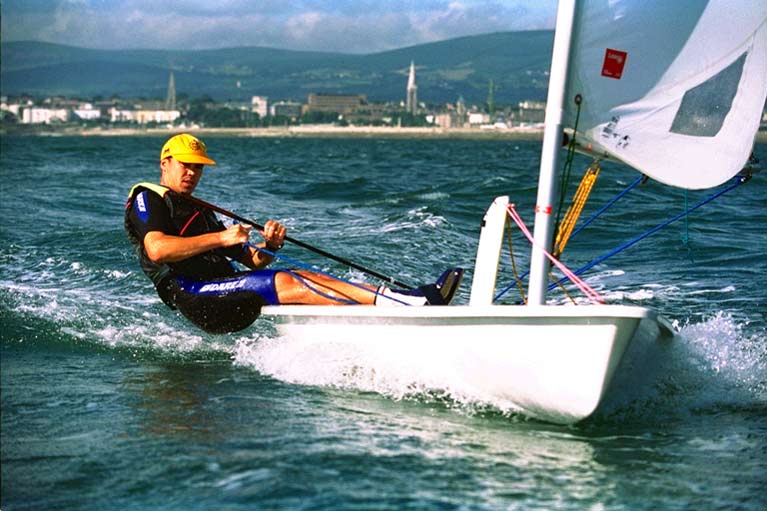 Mark Lyttle (NYC) training in Dublin Bay for the first Olympics with the Laser in 1996, when he was a race winner. Photo: David O’Brien/Afloat.ie
Mark Lyttle (NYC) training in Dublin Bay for the first Olympics with the Laser in 1996, when he was a race winner. Photo: David O’Brien/Afloat.ie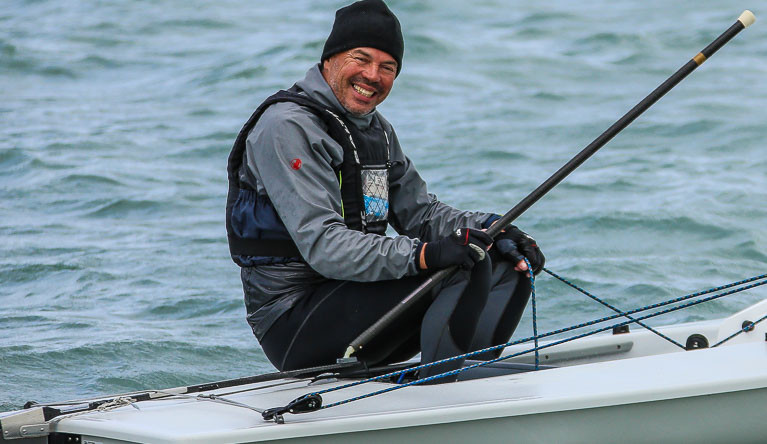 Mark Lyttle after winning the Grand Masters Division in the Laser Worlds in Dublin Bay in September 2018. Photo: David O’Brien/Afloat.ie
Mark Lyttle after winning the Grand Masters Division in the Laser Worlds in Dublin Bay in September 2018. Photo: David O’Brien/Afloat.ie
But equally, as the “Masters” categories begin at age 35, there were quite a few helms who had yet to make their debut on the planet when the Laser was already born, so the vintage overall nature of the boat could well match the impressive range of maturity of some of the most senior helms.
This will be in evidence at the Irish Laser Masters this weekend in Howth, where they’ve had a continuous Laser racing programme on the go since 1974. But though Howth’s annual frostbite series for this timeless little boat continue to attract a healthy turnout, as is so often the case the sheer population weighting to be found south of the Liffey means that Dun Laoghaire names pack numbers and success, and defending champion in the Radials is RStGYC’s Sean Craig, who expects strong competition from clubmate Marco Sorgassi, while the home club’s Dan O’Connell, Dave Quinn and Daragh Kelleher are in winning form.
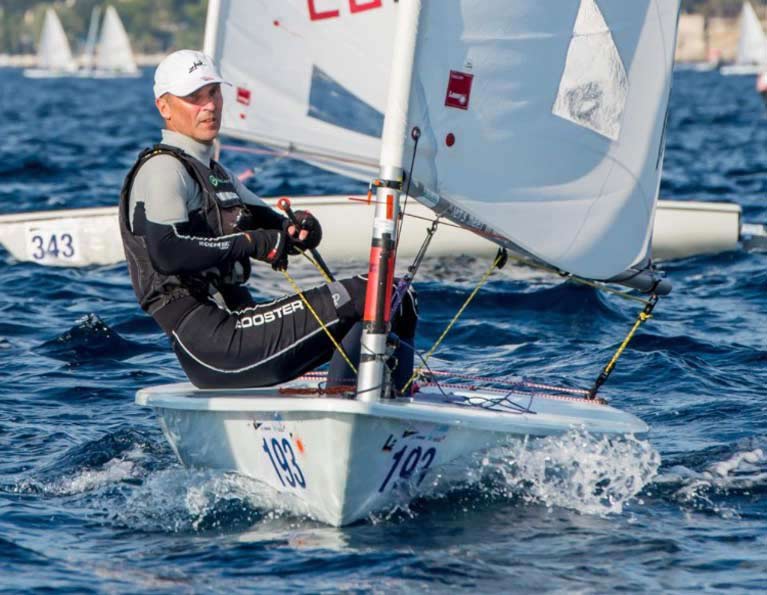 Sean Craig, defending champion in the Radials this weekend’s Irish Laser Masters at Howth
Sean Craig, defending champion in the Radials this weekend’s Irish Laser Masters at Howth
These are all sailors to whom the adjective “timeless” could equally apply - living embodiments of the saying that sailing is a sport for youth of all ages. And even if the Laser does get replaced in the Olympic stakes by some newer design – as has been hinted for the French Olympics in 2024 – we only need to look at the story of the International Dragon to realize that Laser sailors will continue to have their sweet little boats as designed by Bruce Kirby playing a very big part of their life afloat well into the foreseeable future and beyond.
Because once upon a time, the International Dragon was very much a part of the Olympic circus. So much so, in fact, that when she got her marching orders after the 1972 Olympics - having been in the lineup since 1948 – there were those who thought it would lead to an inevitable decline in the class.
Dragon Class is Ninety Years Old
But on the contrary, it seems that most Dragon sailor cared a lot more about the joy they got from their boats than they did about the Olympic thing. So much so, in fact, that today the class is facing into year 90 in the very best of health, and its big championship, the 2019 Yanmar Dragon Gold Cup at Medemblik in the Netherlands from the 8th to 14th June, has already attracted more than a hundred boats from 16 nations in four continents, with Jorgen Schonherr from Denmark the defender after the championship in Finland last year.
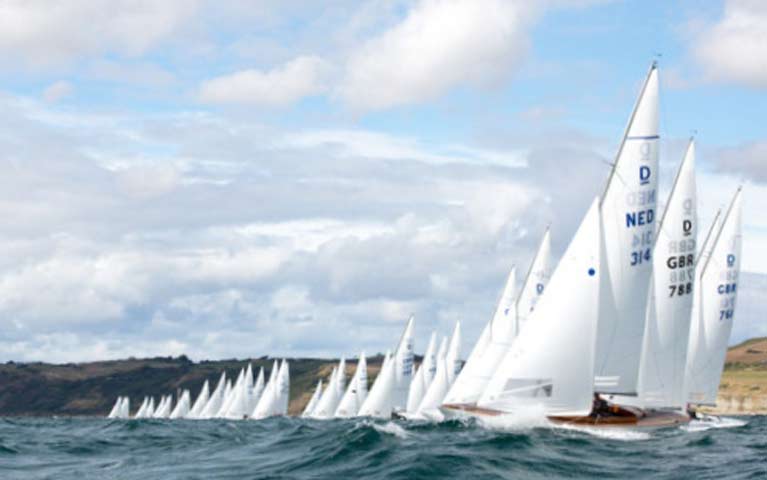 So who needs to be an Olympic class? The Dragon Gold Cup ten years ago. The 2019 event in The Netherlands in June has already attracted more than a hundred entries from sixteen countries.
So who needs to be an Olympic class? The Dragon Gold Cup ten years ago. The 2019 event in The Netherlands in June has already attracted more than a hundred entries from sixteen countries.
The Dragon first appeared in Sweden in 1929 to a design by Norwegian Johan Anker, and there has been Irish involvement in the class since at least 1936. Certainly what is probably the most senior Dragon still racing – Don Street’s Gypsy in Glandore – is all of 86 years old, and she has been in Ireland a long time. As for her extraordinary skipper, he is one of the keenest advocates of the Dragon as a boat for sailors of all ages even if he himself is 89, but he concedes in the Dragon-sailing longevity stakes to Australia’s champion Gordon Ingate, who this year will be 92.
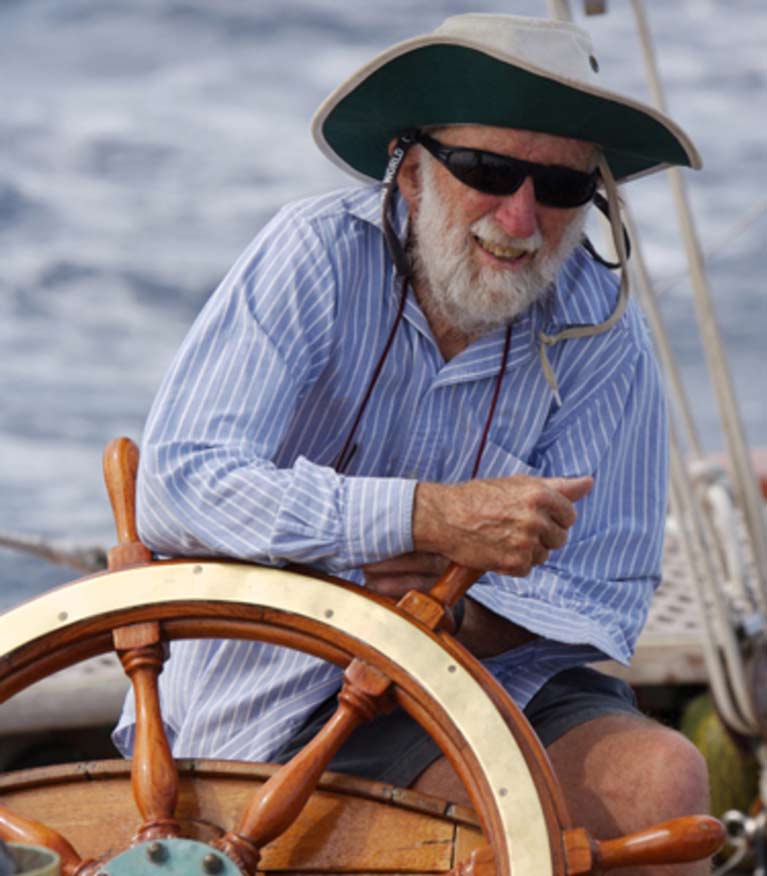 The legendary Don Street – at 89, he races an 86-year-old Dragon with as much enthusiasm as ever
The legendary Don Street – at 89, he races an 86-year-old Dragon with as much enthusiasm as ever
These figures are enough to make anyone dizzy, so to get some idea of the Dragon’s enduring appeal, let’s consider Irish involvement with the Gold Cup, which dates back to 1936. On several occasions, we’ve had a top Irish boat there or thereabouts, but the harsh reality if that it was brought back to Ireland only the once, and it was to Northern Ireland, to the then-thriving Dragon fleet at RNIYC at Cultra on Belfast Lough.
It was 1947, and the winner when the Gold Cup was raced on the Firth of Clyde was Eric Strain of RNIYC helming Billy Barnett’s Ceres. This led in due course to Strain becoming the British Dragon Helm in the 1948 Olympics at Torquay. But as Ceres was just a standard Scandinavian-built Dragon, Billy Barnett – who owned a successful Belfast engineering firm – decided that the exceptional talent of Eric Strain deserved the very best boat that money could buy, so the legendary yacht-building firm of Camper & Nicholson in Gosport were commissioned for the job.
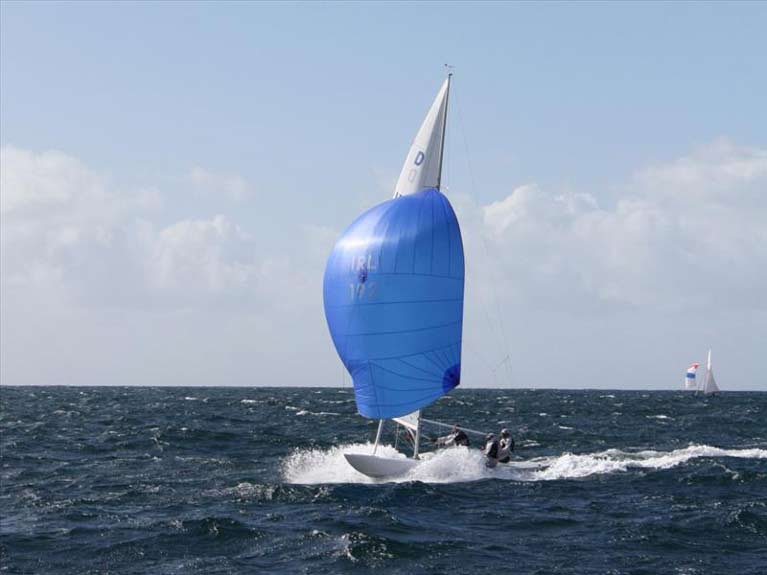 Offshore at Glandore, the Dragons can get up and fly…Photo: GHYC/Richard Harrison
Offshore at Glandore, the Dragons can get up and fly…Photo: GHYC/Richard Harrison
The resulting Ceres II was an exquisite bit of work. Maybe too exquisite. It was suspected that she was slightly heavier and not as fast as the first Ceres, and at the 1948 Olympiad, while Eric Strain and Ceres II did well, it wasn’t quite good enough. They were fourth. In Ireland, we do not need to be reminded of the huge void – a veritable chasm - to be found between the Bronze Medal-winning third and the otherwise commendable but medal-less fourth…….
1948 is now 71 years ago, yet today the International Dragon continues to play a very special role in world sailing. It’s something we take for granted. But what other sport would be continuing to use equipment designs whose unchanged basic concept originated 90 years ago? Boats which - to many of us - still seem well up-to-date.
Historic Ketch Ilen
It brings us back to that concept of timelessness. This weekend, the Limerick ketch Ilen will be on passage from Dunmore East towards Dublin Bay, and when people get to see her at Poolbeg from Sunday evening, and at the Royal Irish YC in Dun Laoghaire next Friday, they’ll be in no doubt that they’re looking at a concept of considerable antiquity, as her design of 1926 was evolved from Conor O’Brien’s Saoirse design of 1923, which O’Brien said was in turn inspired to some extent by a notably able Arklow fishing boat which dated from the 1860s.
Whatever the origins, it means that Ilen is only three years older than the International Dragon, and that the Laser has been around for more than half of Ilen’s existence. Truly, ours is one extraordinary sport. And if you really want to point up the oddities of vehicle design which sailing can produce, just consider that some years ago the berth at the RIYC which Ilen will occupy was very elegantly filled by the 70ft Fife designed-and-built cutter Hallowe’en.
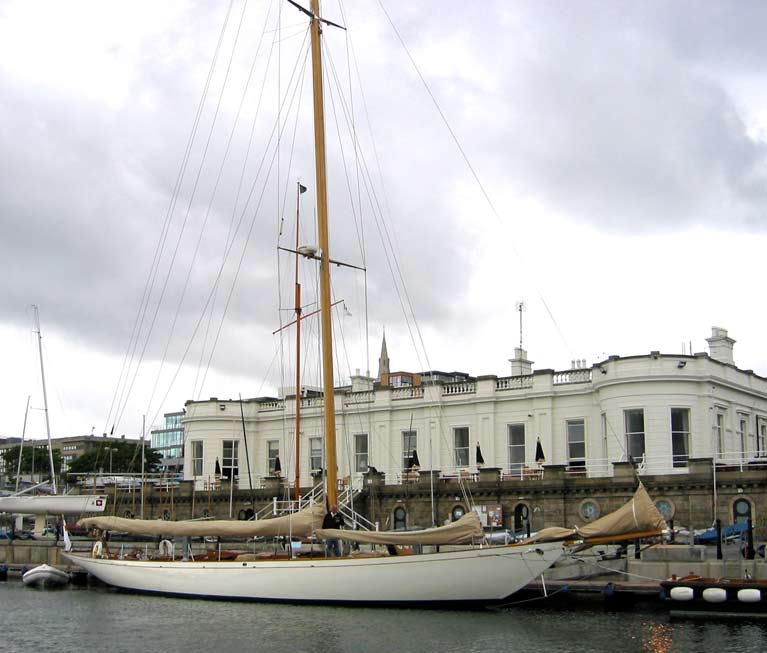 A Fastnet Race record setter, the 70ft Fife cutter Hallowe’en (seen here at the RIYC in Dun Laoghaire) was built in 1926. Photo: W M Nixon
A Fastnet Race record setter, the 70ft Fife cutter Hallowe’en (seen here at the RIYC in Dun Laoghaire) was built in 1926. Photo: W M Nixon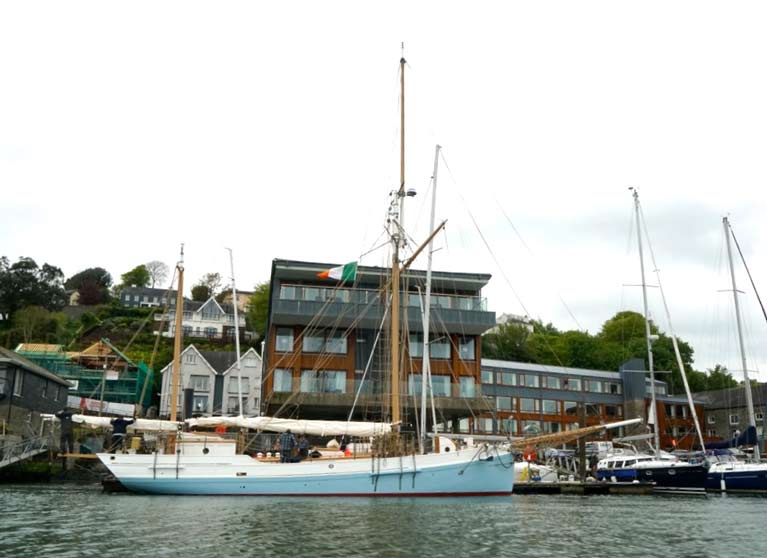 The 56ft Ilen – seen here in Kinsale this week – was also built in 1926. Photo: Gary MacMahon
The 56ft Ilen – seen here in Kinsale this week – was also built in 1926. Photo: Gary MacMahon
Hallowe’en was built in 1926, and she took line honours in that year’s Fastnet Race in a record time which stood for many years. It’s mind-boggling to think that in the same year – and in a boatyard at Baltimore near the Fastnet Rock itself – the unbelievably different Ilen took shape. Yet such is the case, and next Friday we’ll have the opportunity to savour the variety of sailing craft which the special calls of seafaring can produce - and each and every one of them has their devoted adherents.
Two Irish Finn campaigns are looking for five 2020 Olympic berths available at the European Championships in Athens next week.
Both West Cork's Fionn Lyden and Oisin McClelland of Donaghdee in Northern Ireland are now in the Greek capital ahead of next Monday's first race.
Both are campaigning without grant support from Irish Sailing for their endeavours.
Fionn and Oisin moved their base to Athens when the Princesa Sofia event finished in Palma last month in a bid for one of the last chances for the single Tokyo 2020 qualification place.
Last year, McClelland, the sole participant in the Finn European Championships, in Cádiz, Spain, finished 34th overall in his 91–boat fleet.
In March this year, Lyden of Baltimore Sailing Club reached Gold fleet standard at the Trofeo Princesa Sofia Iberostar in Palma.
The Notice of Race for next week's championships is here and the event website is here
Excitement is building in Weymouth for next week's 49er European Championships (May 13 to 19) where Ireland hopes to make a breakthrough in both the male and female divisions in the quest for Tokyo 2020 qualification.
After the third round of the World Sailing Cup in Genoa last month where all three Irish 49ers ended up in the Silver fleet, as did Annalise Murphy and Katie Tingle in the 49erFX, attention is now focussed on an improvement on the British south coast.
All four crews were "training briefly" at the new Irish Sailing Performance HQ in Dun Laoghaire before "intensive preparations" at the London 2012 venue.
Those preparations have included competition at a Warm-up Regatta at the Weymouth and Portland National Sailing Academy.
As Afloat readers will recall, Weymouth and Portland is the scene of some past Irish successes for current members of Team Ireland especially Annalise Murphy and Ryan Seaton. Of course, there was Murphy's memorable fourth overall at London 2012 itself and prior to that Seaton's own gold medal at 2013 Going for Gold Regatta in the build-up to Rio 2016.
This month, however, the best result so far from Team Ireland in Weymouth has come from the young Howth duo Robert Dickson and Sean Waddilove who scored 15th from 52 at an RYA warm-up regatta, days before the main event and significantly on the same race track.
It's hard to work out just how seriously the regatta has been taken by the fleet as there were a number of international absentees and plenty of DNC's (did not compete) on Irish scoresheets. Nevertheless, team officials will, no doubt, be hoping for improvements from Murphy and Tingle who sailed only four from eight races (best result 13th) and Seaton and Guilfoyle who, although entered, did not compete in the two-day competition. Results are here.
There was Laser fleet drama for the National Yacht Club's top performing Finn Lynch yesterday when he was disqualified from the second race of the day following a black flag in his 111-boat fleet. So tight are the points at the top of the Laser fleet that even with his super consistency (four results from six in the top ten so far), the race six DSQ result dropped the 22-year-old from third to sixth overall and he is now nine points off the overall lead.
He described his day on the water as 'mixed' (he had an eighth in his first race) but reaching the top ten of this ultra-competitive gold fleet cut is an achievement in itself.
Three races will be attempted today to determine the top-10 boats to sail in the medal race final on Sunday and Lynch will be determined to keep up his medal race participation after top ten finishes twice already this season in Miami and Palma.
The Carlow veteran of the Rio 2016 Olympics had started the day in the top three of his event and posted two top-10 results. However, he was disqualified for early starting in his final race eight, this meant he had to count his earlier worst score, an 18th place. That dropped Lynch to sixth place overall but just four points from the top three ahead of Sunday’s medal race final.
2017 and 2018 Laser World Champion Pavlos Kontides (CYP) is the model of consistency in the 111-boat Laser fleet. The Cypriot is the only competitor that does not hold a double-digit score and it has resulted in him grabbing the lead.
The Laser pack completed their opening series on Friday and will advance to gold and silver fleet racing on Saturday before Sunday’s Medal Race.
Kontides will carry a four-point advantage over Jonatan Vadnai (HUN) in the gold fleet. Hempel World Cup Series Miami gold medallist Hermann Tomasgaard (NOR) is third overall but there is minimal separation at the top of the pack and with three races to follow, anything can happen.
Gold Fleet for Aoife Hopkins
In the Women’s Laser Radial event, after a poor start, Howth Yacht Club’s Aoife Hopkins overtook Aisling Keller in the stakes to qualify for the Gold fleet. Tipperary sailor Keller will now sail in the Silver fleet final series after narrowly missing out by just two points.
Full results are here. Check out all our Irish Olympic sailing coverage in the build-up to Tokyo 2020 here
Annalise Murphy & Katie Tingle Debut With Fifth, Dickson & Waddilove Take a Second at Genoa World Cup Regatta
A top-five result for Annalise Murphy and Katie Tingle in their first ever international 49erFx event scored yesterday in race two raises some great prospects for the Irish Olympic Sailing Team at the World Cup in Genoa this week. There was another first-day highlight for Ireland in the men's skiff when Howth Yacht Club's U23 World Champions – and Afloat Sailors of the Year – Robert Dickson and Sean Waddilove took a second place.
Lights winds meant only two from three races were completed on the Charlie and Delta courses but, as always, it will be consistency that will be the key to success by Friday. The sole Irish 49erfx crew also counted mid-fleet opening results to leave the girls 26th from 49. In a disappointing first day for double Olympian Ryan Seaton and Seafra Guilfoyle, the Belfast-Cork pairing are 40th with Dickson and Waddilove 27th from 65. Full results are here.
The long-awaited return of the silver medalist to the Olympic circuit plus the added attraction of on-form Finn Lynch today in the Laser is heightening the possibilities of World Cup medal(s) for the Irish sailing team by the end of this week's important World Sailing event, the third round of the season.
"Nine boats, four disciplines, 13 sailors"
In making her International debut, Murphy completes the team having missed last year's important World Championship Qualifier in Denmark. Murphy, like the rest of her teammates, still needs to make the nation qualification standard later this year making for a challenging 2019 season.
The jury is still out on whether or not it is ideal preparation but what we do know is that with little over a year to the Olympic games it is the first time in the Tokyo cycle that all the Irish team will compete at the same event; nine boats, four disciplines, 13 sailors.
The qualifying series in the 49er, 49erFX and Nacra 17 continues today at 11:00. The Men's and Women's 470, Laser, Laser Radial and the Finn will also start their opening series.
Dickson & Waddilove Out of Palma Competition Due to Injury
Consistent sailing will be the key if the Irish Olympic sailing team is to make good on promises of a strong peformance on the Bay of Palma this week. While none have yet reached the qualification standard for Tokyo 2020, the group, a mix of male and female Laser and Skiff campaigns, are now launching into a challenging season where securing a berth on the Tokyo startline is the absolute priority and for most of them this starts here at the Trofeo SAR Princesa Sofía regatta.
As probably the most popular annual Olympic classes regatta in the world it is no surprise that the 50th anniversary Trofeo SAR Princesa Sofía Iberostar has drawn a record fleet to the Bay of Palma.
Nine of the ten Rio 2016 Olympic gold medal-winning sailors or pairs are racing at the Trofeo SAR Princesa Sofía Iberostar.
In action for Ireland are Laser men, Finn Lynch, Liam Glynn, Ewan McMahon as well as 49er skiff team Ryan Seaton and Seafra Guilfoyle. Afloat.ie Sailor of the Year Rob Dickson was meant to sail but sailing partner Sean Waddilove is now out due to injury it has been confirmed tonight by the team. Also racing are National Yacht Club brothers Sean and Tadhg Donnelly.
As Afloat.ie previously reported, although Ireland has still to qualify for Tokyo in any class, once the nation is qualified, Irish sailing's trials criteria means finishing in the top half of one of the 2019 qualifying regattas that include Palma. What's more, next week's Spanish regatta has added significance as it is the first of two trial events in the Laser to determine which Irish sailor will attend the Tokyo test event in August.
Dun Laoghaire's Finn Lynch, in particular, will be keen to continue his early season form. In Miami, in January, for example, he became the first ever Irish Laser sailor to qualify for a World Cup Medal Race, a sign perhaps that qualification is on the cards for the Rio veteran later this season?
Unfortunately, however, despite the opportunity for some excellent competition this week Annalise Murphy and Katie Tingle in the 49er FX will not be competing. The Irish Laser Radials are not in action either, due to exams, thus making a challenging qualification season now even tougher.
Club Nàutic S’Arenal
The golden jubilee regatta has mustered 1,224 sailors, 869 boats in ten classes all from 67 different nations the huge Olympic classes competitions congregate over eight race areas administered from the sailing clubs the Club Nautico S’Arenal and the Club Marítimo San Antonio de la Playa,
As the Princesa Sofía Iberostar reaches its remarkable landmark the celebratory ambience around the boat parks and the clubs gives way Monday to the business of racing.
This annual gathering of the clans and the classes on the Balearic Island of Majorca is always a vital first check in with the rivals, the earliest big fleet opportunity to benchmark improvements after the winter period of training and racing. Or in some cases it is the idea arena to return to Olympic classes competition arena after a more protracted post-Olympic break.
A glittering 50th anniversary gala on Saturday evening was hosted at the Son Termes estate and was attended by Her Majesty Queen Sofïa. It was attended by Spain’s Minister of Industry, Commerce and Tourism, Reyes Maroto, the president of the Government of the Balearic Islands, Francina Armengol, and the president of the World Sailing (International Sailing Federation), Kim Andersen.
Queen Sofia offered a few words of thanks and congratulations "To all those who over these 50 years have made it possible for this regatta to be run in such a wonderful way on the unrivalled waters of the Bay of Palma, setting up this trophy as a national and international reference in the sport of sailing ".
HM Queen Sofía also offered special recognition for Rear Admiral Marcial Sánchez Barcaeiztegui and Jaime Enseñat who are considered the originators of the regatta.
Jaume Carbonell, who was the Trofeo Princesa Sofía event manager over two periods (1988-92 and 2004-11) praised Enseñat, who was president of Mallorca Tourism Promotion in 1968.
“He had the idea of the island benefitting from the promotional value of a major sports event to put Mallorca in the world map as an emerging tourism destination back then”.
Enseñat was, according to Carbonell, a pioneer of sports sponsorship.
“He ensured that for the first time that a private company gave its name to the Trofeo Princesa Sofía and invested some money that enabled thinking big and set the foundations of what today is the best Olympic classes’ regatta in the Mediterranean and probably in the whole world”.
“Thanks to this, the Princesa Sofía changed from being a Club regatta to become Mallorca’s showcase regatta, known all around the world”, said Carbonell.
Nine from Ten
Nine of the ten Rio 2016 Olympic gold medal winning sailors or pairs are racing at the Trofeo SAR Princesa Sofía Iberostar.
Since they won the 49er gold medal in Rio in 2016 New Zealand’s Peter Burling and Blair Tuke have won the America’s Cup and competed in the Volvo Ocean Race round the world. As they set out to defend their Olympic title next year in Tokyo Burling and Tuke return to the 49er fleet for the first time since Rio, choosing the Trofeo SAR Princesa Sofía Iberostar and the Bay of Palma as their first major event after training at home during the New Zealand summer with a flourishing Kiwi 49er squad. Blair and Tuke will have a fleet of 107 49ers, a class record, to contend with on their return.
“We are here to get back into it. We have had really good training group at home, it has been fun there but it is good to be back into it in Europe. We have a good few blocks of time at home, we feel pretty comfortable in our handling, it is about making sure you get these little details back which will I am sure will come back. It is cool to see the fleet so big and probably reflects a bit what is going on what is happening in the rest of the sailing world. It is looking pretty secure for a while.” Burling, who won the title here with Tuke in 2015 when they were last here, says,
“It is fun sailing here and with the Cup stuff we have on it is good to do some sailing. Andy (Maloney) and Josh (Junior) from our Cup team are doing Olympic campaigns and are here too. It fits in well with our programme and it is quite similar to what we did last time, a good balance some design time, some big boat sailing and some little boats. It is all part of the plan.
Following a similar programme is Great Britain’s Giles Scott, with Ineos Team UK hoping to wrest the America’s Cup from the Kiwis, and looking to defend the Finn gold medal title which he won in Rio. Scott has done three Finn regattas since he won here last year, two lower level regattas in Australia this winter and the Enoshima Japan 2019 World Cup series opener last September where he finished runner up.
“At the end of last year we went to Australia and did a couple of trips there and then came up to Palma in February and have been in and out since then. So I have had some reasonable time in the boat since then which is nice after the last 18 months or so.” Says Scott, “At the moment I can manage the Cup programme and this alongside each other. It will not get any easier from that point of view. It is working fine. I don’t know where I am with regard to the fleet and so that is what we come here for. It is great to have this regatta. Everyone goes off through the winter and it is nice to come back and see what everyone has done. For me the best thing is being properly back into it and feeling good.” Says Scott,
“I do love it here. It is amazing. Formats change, World Cups come and go, and this is the constant. Everyone always comes. Everyone always loves it. They always put on a good regatta here. And so the sailors always respond to that and turn up in their masses.”
Argentina’s Olympic Nacra 17 champion Santi Lange has lost count of the times he has been to the Trofeo SAR Princesa Sofía Iberostar.
“It is a lot more than twenty.” Smiles Lange who with crew Cecilia Carranza Saroli finished third in Miami in January and third at last year’s World Championships, “Everyone is so passionate and supportive here it is always great to be here. In the ‘good old days’ everything was brought here by the military and a lot of things were provided free. I once did this regatta when I was working in Southampton and came by train. I remember being at Victoria Station in London at 5am in the morning, travelling with mast, boom, daggerboard, rudder and everything. We were crazy to be here.”
Lange adds: “It has changed a lot but this I am always happy to be here. It is all so much more professional now than it was but this is such a cool place. There are cheap places to stay and it is a great place for training camps. And this is such a good regatta for younger sailors to come and race with the best in the world. That used to be the case in Hyeres, Spa, Medemblik and now it is not and this is what there is. I do think we should keep pushing to have big regattas where newcomers can come and race against the good guys and girls.”
“For us we have come here a little late and so our first thing is to check in with the fleet and see where we are, and then we fix our objectives. We had some good training in Uruguay with a good group. This is a technical class where everyone is learning and improving all the time.
Who’s who?
The 470 Men’s class has 73 entries. Winners here in 2018 were Australia’s Olympic silver medallists Mat Belcher and Will Ryan who return to open their season on the Bay of Palma. The world champions Kevin Pepponet and Jérémie Mion (FRA) finished seventh in Miami in January and are among a 13 strong French 470 mens squad. In Miami it was Spain’s Jordi Xammar and Nicolas Rodriguez who prevailed.
In the 470 Women’s fleet there are 45 entries. Japan’s Ai Kondo Yoshida and Miho Yoshioka are World Champions and won here last year. Olympic champion is GBR’s Hannah Mills who sails with Eilidh McIntyre. Germany’s top two 470 crews finished first and second in Miami, Loewe and Markfort winning from Oster and Winkel. Mills and McIntyre were fourth at the Miami World Cup.
In the 45 boat Finn class Giles Scott is the defending Sofia champion and the Olympic champion. Sweden’s Max Salminen won in Miami, was World Championship runner up in Aarhus. World Champion Zsombor Berecz is not entered here.
The 108 strong 49ers see the return of Burling and Tuke, the Olympic champions. World champions 2018 are Croatia’s Sime and Mihovil Fantela. The winners here in 2018 were Yago and Klaus Lange (ARG).
Over 180 Laser standards are entered. Cypriot Pavlos Kontides stands out as world champion in 2017 and 2018 and Olympic runner-up in London 2012 and winner in January in Miami. Olympic champion is Australia’s Tom Burton while Miami’s dominant winner was Norway’s Tomasgaard.
In the Laser Radial there are 120 sailors and favorites Marit Bouwmeester the Olympic gold winner from Rio 2016 and the Belgian Emma Plasschaert, current world champion.
In the 49er FX, Annemiek Bekkering and Annete Duetz (Holland) are looking to defend the title of Sofía Iberostar champions. They are also the current world champions. Winners in Miami were Brazil’s Martine Grael and Kahena Kunze, Olympic champions.
Italy’s Ruggero Tita and Caterina Banti are world champions who start as favourites in the Nacra 17 class which has 59 entries. France’s four times World Champions Billy Besson and Marie Riou return to race in Palma after Riou raced on the Volvo Ocean Race last year. Olympic champions are Lange and Cecilia Carranza Saroli. Australia’s Jason Waterhouse and Lisa Darmanin won in Miami.
The RS: X male and female classes see this regatta as a prelude to the the European Championship that will take place at the Club Nàutic S'Arenal immediately after this event, from 8 to 13 April. The current female windsurf world champion, the Dutch sailor Liliana De Geus, who also won the 2018 edition of the Sofía Iberostar, will be the rival to beat the Japanese Peina Chen and the Andalusian Blanca Manchón as main competitors.
On the male windsurfing side, the Spanish sailors such as Canarian Ángel Granda and the Balearic Sergi Escandell at the head, is emerging as one of the main powers in the Majorcan regatta.
Irish Sailing Can Apply for Extra 'Discretionary' Funding From Olympic Federation of Ireland
The Olympic Federation of Ireland today announced a significant investment in its member federations, including Irish Sailing, dedicating a fund of €250,000 for 2019 to Olympic focussed projects across the Olympic cycle.
The OFI’s ‘Discretionary Funding’ programme was first introduced in July 2018. The 25% increase in funding for year two of the programme is being provided in addition to scholarship programmes and investments by the OFI to support athlete and team participation in Olympic events.
Olympic Federation of Ireland CEO, Peter Sherrard, announced the 2019 Discretionary Fund increase saying,
“We look forward to contributing 25% more funding this year to support Irish athletes and performance programmes at this important phase of the Olympic cycle. The 2018 applications demonstrated high levels of innovation and focus from our NGBs as well as the strong demand across Irish sport for additional resources.”
The 39 member federations of the Olympic Federation of Ireland will be invited to apply for funding of between €5,000 and €30,000 under one of three headings: ‘Make a Difference’ projects, ‘Performance Coach Support’ or ‘National Federation Olympic Development’ support.”
Member National Governing Bodies will have until April 4th to make applications and these will be reviewed by a five-person panel, including Sport Ireland and independent members in line with weighted criterion set out in the application.
In 2018 the Olympic Federation of Ireland provided grants to 19 projects under this funding stream.
The Discretionary Fund is designed to leverage existing funding going to NGBs from Sport Ireland, Sport Northern Ireland and other sources.
Details of the application process for member National Governing Bodies can be found HERE.



























